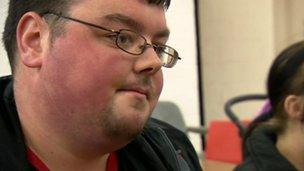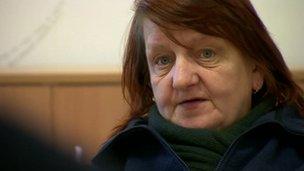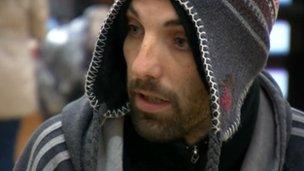Budget 2013: 'One of the hardest places to find work'
- Published
Kevin Edge and family tell the BBC's Chris Buckler that looking for work is like a lottery
Residents on the Orchard Park estate in Hull say this is one of the hardest places in the UK to find a job. The statistics back their theory up.
This city has the highest number of people claiming jobseeker's allowance in the UK. And Orchard Park is in its most deprived ward.
Around a table in the local community centre I find mother, father, daughter and son all looking for work. In Hull unemployment can be a family problem.
"I am tired of living off benefits and struggling," says Kevin Edge.
At one time he served in the Army but now he says he is unable to find any work.
"It does feel like I'm smashing my head against a brick wall. I ended up on tablets because of the stress.
"If they said there was a job sweeping the streets I would go and do it tomorrow."
Going without
He is not the only member of the family to feel disillusioned after a series of job rejections.
They insist that dozens of people apply for every position that is advertised.
"I'm after factory work or painting and decorating, but there is nothing," says his stepson Geoffrey Whitaker, who is just turning 20.
He has been claiming unemployment benefits for more than three years.
"I have tried everywhere. There is just nowt there."
There is a clear family spirit and they talk about lending each other money to help out.
But there are moments when they all become clearly emotional as they consider the difficulties of living on the dole.
"It is the small things," says Geoffrey's mother Coleen.

Son Geoffrey, 20, has been looking for work for three years
"The children will ask can I have this Mum or Dad. And I'll say, 'No, you can't', because you can't afford to give them it."
And there is one question that upsets Coleen more than any other: How does it feel to see her children facing the reality of long-term unemployment?
As she considers her answer she falls silent, puts her head in her hands and starts to cry.
"She worries day in and day out about where the next piece of money is coming from," says her husband Kevin as he puts his arm around Coleen to comfort her.
Dependency culture
Outside at the weekly car boot sale there is evidence that many people are worried about cash.
A steady stream of people walk past the stalls into the community centre, however, relatively few stop to make a purchase.
According to one of the stallholders they are not coming here for the bargains. Instead, it is the opportunity to stay warm in the centre rather than facing the cost of heating their home for the afternoon.
"They haven't got money, not on the estates," insists Rick Canham who is selling DVDs and computer games.

Christine Anderson does not want to have to rely on the dole, she wants to work
"Even the market has gone because people were not spending their money."
A large number of households here are reliant on benefits. And there are some who feel that more needs to be done to encourage people out of the so-called welfare trap.
"We have got to take tiny steps to unravel the dependency culture," insists Sherilee Jepmond who has lived in Orchard Park all her life.
She was made redundant, but was determined to get back into employment for the sake of her son.
"When I became unemployed I thought what am I going to do.
"And I went to university and I got a degree. I gave my son the work ethic."
Education and training are big issues in areas like Hull. Job advisers have said that there are hundreds of unfilled vacancies in the city, but the applicants are not qualified to fill them.
'Degraded'
In the estate's lottery-funded job club there are many who feel the odds are stacked against them.
And they are angry at the suggestion that they are happy to sit on benefits.
"I feel degraded going down to the job centre and signing on every fortnight just for a bit of money," says Christine Anderson as she looks through the job ads.
"If I could work and get a job I would come off the dole."
Most say they have been on training schemes and secured short-term contracts, but what they really want is a permanent position.
John Platten, who used to work building caravans, says in recent months he has submitted between 60 and 80 applications for jobs and he has not had a single response.
"The frustration is that for what jobs there are, they aren't offering enough hours for a family to be able to live on," claims John.
"The caravan industry - it's starting to take off a bit now but with the recession about 1,500 people lost their jobs from the industry.
"With that many people losing their jobs, everybody is trying to get back in there."
Role models
Some are staking their hopes on plans for a new shopping centre in Orchard Park.
However, all accept that attracting and keeping any jobs those shops might bring will depend on the economy improving.

Gareth Dale wants to set a good example to his children by getting a job
"We have had a lot of redundancies in both the private and public sector in the last year to two years, so yes it is increasingly hard," admits Pam Cavanagh, who is managing director of Latitude which runs the job club.
"It is difficult, and it is difficult to keep the motivation going, to keep applying for jobs where there are hundreds of people going for each job.
"Generally the economy needs to generate more jobs."
Back in the community centre there are people desperate to be seen as a working role model for their children.
Gareth Dale is training to be an instructor at the gym they have just set up inside the centre, with the help of lottery and other funding.
For Gareth it offers an opportunity out of unemployment.
"I want my kids to get a job," he says. "They're going to look up at me hopefully and think he is doing something with his life instead of being a bum."
That determination is needed in an area where just getting a job is hard work.